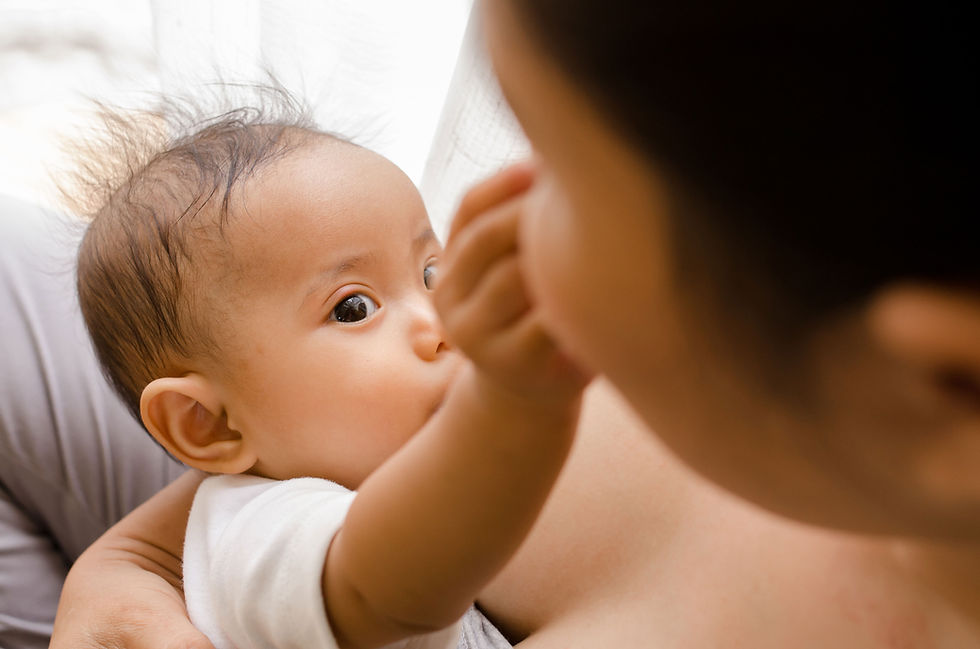Is It Really Wind? Or Could It Be Something Else?
- mfalqurashi
- Dec 6, 2024
- 3 min read

As parents, we often hear that babies need to be burped after every feed. We're told that trapped wind is the cause of so many baby woes, from crying to squirming to sleepless nights. This cultural obsession with winding can sometimes lead us down a rabbit hole of back-patting, leg bicycling, and frustration when no burps or farts appear. But what if wind isn't the problem?
Babies are born with very immature digestive systems. It’s completely normal for them to have gas—it’s just part of being human! A baby’s body is well-designed to deal with this naturally, and most of the time, they’ll pass their wind without much help. Yet we often mistake their cues for a wind issue, convincing ourselves that stubborn burps must mean stubborn wind.
Here’s something to consider: if you’ve tried to wind your baby for a few minutes and nothing happens, there may not be any air to release!
Babies who breastfeed well tend to swallow very little air, and even bottle-fed babies don’t always need burping after every feed. In fact, some babies are quite happy to move, stretch, or simply sit upright and let the air escape naturally.
Burping Can Be Gentle and Simple
Burping doesn’t need to be an ordeal. Often, just holding your baby upright on your shoulder is enough. The air bubbles will naturally rise to the top of the stomach, and after a little nap or cuddle, you may find the burp comes all on its own. Gentle back rubs or slow, circular movements can help too—there’s no need for vigorous patting or waking a peacefully sleeping baby.
Research even suggests that overzealous winding (especially with hard slapping on the back) may cause more harm than good, potentially increasing reflux symptoms rather than reducing them.
Could It Be Something Else?
When babies are fussy or grizzly, we often assume wind is the culprit. But their discomfort is just as likely due to:
Wanting to be held close—babies are biologically wired to need contact.
Wanting to nurse again—feeding provides comfort as well as nutrition.
Feeling overwhelmed—newborns are sensitive to sights, sounds, and sensations.
If your baby isn’t releasing much wind and continues to be unsettled, ask yourself: could they simply need cuddles or another feed?
Why Is Gas So Noisy at Night?
Around 3–6 weeks, many parents notice their baby grunting, groaning, and wriggling, especially in the early hours of the morning. While it may look like they’re uncomfortable, this is usually a sign of their immature digestive system working things out. It’s normal and temporary—babies do grow out of it as their guts develop.
Burping Isn’t Always Necessary
While some babies benefit from a gentle burp after a feed, others don’t need it at all. If your baby is happy, sleeping, or feeding well, trust their cues. And if they’re fussy, remember to look beyond wind—you might find they simply need you to hold them close and reassure them that all is well.
You’re Doing Brilliantly
This stage of parenting can feel overwhelming, especially as babies wake up to the world and their needs seem endless. You may feel pressure to have everything figured out or to meet society’s expectations of how a “good” baby should behave. But you’re already doing an incredible job. Trust your instincts, snuggle up, and know that this intense period will pass.
If you’re ever unsure or struggling, reach out for support. Your baby doesn’t need you to be perfect—they just need you to be there.
Marion Frey-AlQurashi, Breastfeeding Counsellor, Certified Lactation & Breastfeeding Specialist, Mindfulness Breastfeeding Practitioner.
%20(Landscape))-2.png)





Comments